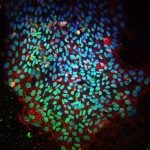Lien vers Pubmed [PMID] – 21408151
Lien DOI – 10.1371/journal.pone.0017235
PLoS One 2011 Mar; 6(3): e17235
The nuclear genome of eukaryotes is colonized by DNA fragments of mitochondrial origin, called NUMTs. These insertions have been associated with a variety of germ-line diseases in humans. The significance of this uptake of potentially dangerous sequences into the nuclear genome is unclear. Here we provide functional evidence that sequences of mitochondrial origin promote nuclear DNA replication in Saccharomyces cerevisiae. We show that NUMTs are rich in key autonomously replicating sequence (ARS) consensus motifs, whose mutation results in the reduction or loss of DNA replication activity. Furthermore, 2D-gel analysis of the mrc1 mutant exposed to hydroxyurea shows that several NUMTs function as late chromosomal origins. We also show that NUMTs located close to or within ARS provide key sequence elements for replication. Thus NUMTs can act as independent origins, when inserted in an appropriate genomic context or affect the efficiency of pre-existing origins. These findings show that migratory mitochondrial DNAs can impact on the replication of the nuclear region they are inserted in.

